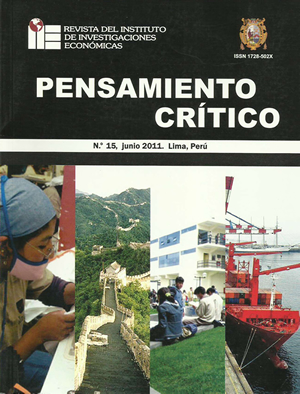Importancia de la necesidad de la coerción mutua en la globalización o la descivilización progresiva
DOI:
https://doi.org/10.15381/pc.v15i0.9084Keywords:
market, central planning, state intervention, proletarian dictatorship, communism, capitalism, plutocracy, decivilization, mutual coercion, globalization.Abstract
The lack of inclusion within the current global economic growth model adopted by most countries, evidenced by the growing gap that is being generated between rich and poor, the capitalist-liberal economic model that privileges the market over all things, encourages the struggle for greater competition and financial transactions to discourage speculation of higher yields produce goods or provide services that are essential for life, where capitalism has become a plutocracy, an oligarchy that is where they are concentrated large amounts of money also hold political power worldwide. According institutions and researchers from prestigious indicate a boundless ambition than 1% of the world’s population does not hesitate to condemn the remaining 99% poverty, indicate that the 225 richest people in the world have a combined equity than annual income of the poorest 47% of the population, or have an income equivalent to the income of 2.500 million. Provide that the maximum concentration of money is given in the financial capital, specifically in the global banking system, which has 60 times more money than the owners of other businesses, factories, industrial goods and other services. However, we must also recognize that according to reliable information, poverty today is less than 13% of the world where 140 years ago only 85% is reached, which could for us to be indicating that the increase of the gaps mentioned is an exaggerated concern. Economic liberalization has allowed our country to grow at rates leading steadily in the last 10 years and also among the 80 early and middle of the first decade of this century, China has lifted over 500 million people of poverty and India, the second most populous country, reduce the poverty rate in half. Others indicate that the cause of this growing gap between rich and poor is the technological development which is winning the race against the human capital and organizational skills. This distancing between rich and poor is unsustainable over time, because they generate problems of governance. Considering that power is the ability to control resources, therefore the rich who account for global political power, which has caused and will continue producing protests and movements as the “outraged”, “Arab spring” in the world, who want to reverse these great inequalities and inequities. Inequality in income and consequent growing gap between rich and poor is a concern and several research studies to identify the correct diagnosis and succeed in their solutions, since there are many non-monetary variables whose interrelationship of global effects is very difficult to analyze. That is why in this article we review some historical aspects considered relevant in the current global context, the importance of the U.S. Central Bank, the existence of fiat money, the current progressive deregulation and central bank in the country, the recipe of the teaching Washington Consensus economic, global imbalances, inflation and asset bubbles, which would explain the consequences and present situation of global financial and monetary system in which we are engaged all, considering some alternative solutions in their effects on the economy real and social welfare, such as the need for greater collective awareness of the economics of global common good, through the necessity of mutual coercion to achieve selfinterest properly socialize, avoiding decivilization.Downloads
Published
Issue
Section
License
Copyright (c) 2011 Jorge Barrera Herrera

This work is licensed under a Creative Commons Attribution-NonCommercial-ShareAlike 4.0 International License.
THE AUTHORS RETAIN THEIR RIGHTS:
a. The authors retain their trademark and patent rights, and also on any process or procedure described in the article.
b. The authors retain the right to share, copy, distribute, execute and publicly communicate the article published in Pensamiento Crítico (for example, place it in an institutional repository or publish it in a book), with recognition of its initial publication in Pensamiento Crítico.
c. The authors retain the right to make a subsequent publication of their work, to use the article or any part of it (for example: a compilation of their works, notes for conferences, thesis, or for a book), provided they indicate the source of publication (authors of the work, journal, volume, number and date).






